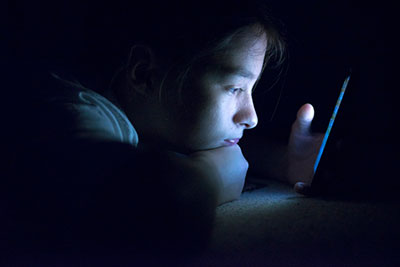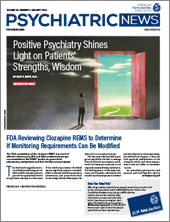Numerous studies have established a strong link between evening screen time and poor sleep quality. Yet should that association result in guidance from a child and adolescent psychiatrist, urging families to institute blanket bans on screens in bedrooms? That question was debated yesterday at this year’s American Academy of Child and Adolescent Psychiatry’s (AACAP) annual meeting in New York City by members of AACAP’s Media Committee.
At the start of the debate, Paul Weigle, M.D., the session’s chair, took a poll of the room, asking if attendees thought child and adolescent psychiatrists should advocate banning screens from bedrooms. Fifty-four percent of participants agreed, while 25% disagreed, and 21% were unsure.
Argelinda Baroni, M.D., Lauren Hale, M.D., and Dale Peeples, M.D., argued in favor of banning screens from bedrooms. Some of their reasons included the following:
•
Screens in bedrooms contribute to poor sleep; they outlined the numerous consequences of poor sleep and the importance of sufficient, restorative sleep as fundamental to optimal functioning of the human body, especially the developing mind.
•
Screens and social media apps are addictive.
•
Unrestricted access to screens in the middle of the night is unhealthy.
While the ban proponents acknowledged that screen time in some capacity can have benefits for youth, they emphasized that those benefits can also be achieved in the living room, without disrupting sleep. “As your doctor, I can honestly tell you that you will feel better, sleep better, and have better concentration if you keep electronics out of your bedroom,” Peeples said.
On the opposite side of the debate were Gino Mortillaro, M.D., Ray Pan, M.D., and Michael Tsappis, M.D. They acknowledged the negative impact that screens have on sleep, but argued that bans are rarely ever followed. Other points of opposition included the following:
•
Blanket bans have the potential to compromise the alliance between the psychiatrist and the youth, as well as the parents and the youth.
•
Parents need to have a supportive alliance with their children. Banning screens from the bedroom reduces the opportunity for parents to have conversations with their youth.
•
Banning screens also reduces opportunities for the youth to learn how to regulate themselves as they enter adulthood.
Further, they argued that banning screens reinforces a negative emphasis on real, but also imagined, effects of screens, without allowing room to acknowledge the numerous benefits provided by screen access. “Screens are increasingly relied upon for everyday activities, especially by young people,” Tsappis said.
In the rebuttal phase of the debate, Baroni noted that science is on the side of the ban proponents. Hale argued that encouraging moderation and limit setting are one in the same. If youth put their phones away an hour before bed, they may sleep 20 minutes more, which is just enough to reduce the risk of car crashes and improve grades, Hale argued.
On the opposition side, Pan pointed out that when treating substance use disorders, the literature encourages a harm reduction approach rather than an absolute ban. “The idea of making a black-and-white ban really runs the risk of us being hammers and only seeing nails,” Mortillaro said.
The lively debate also drew numerous audience questions from AACAP members, who shared their thoughts and experiences in their own practices. By the end of the debate, Weigle took another poll to determine if either side had swayed more audience members. The result was almost a total reversal of the original poll: By the end, 55% were against advocating for bans on screens in bedrooms, while 35% were in favor of such bans, and about 10% were unsure. ■
The
AACAP meeting will run through Saturday, October 28. Look for additional meeting coverage in
Psychiatric News.

